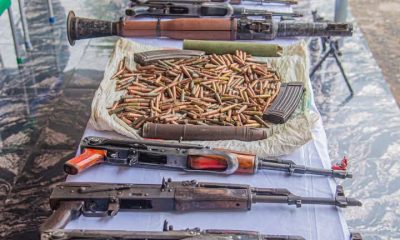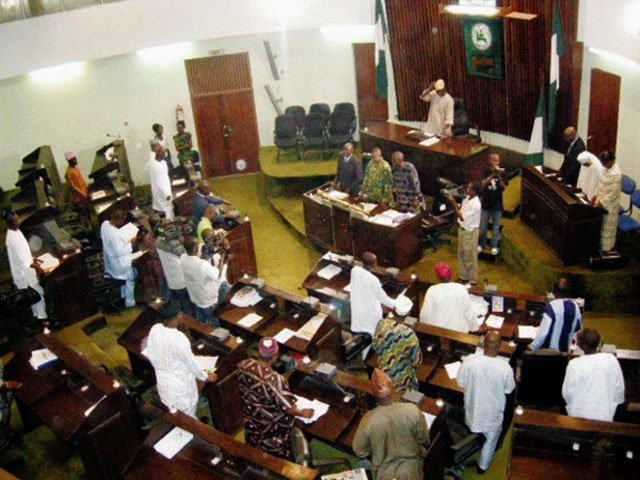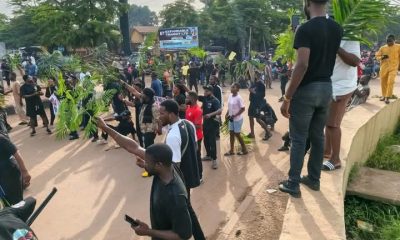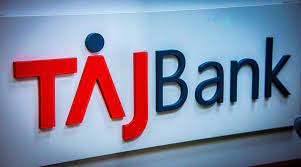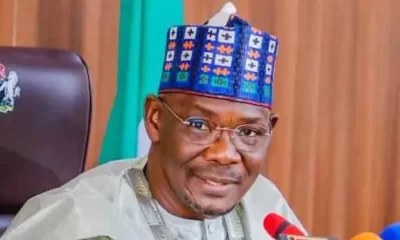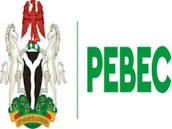EDITORIAL
Still on Southern Kaduna Killings
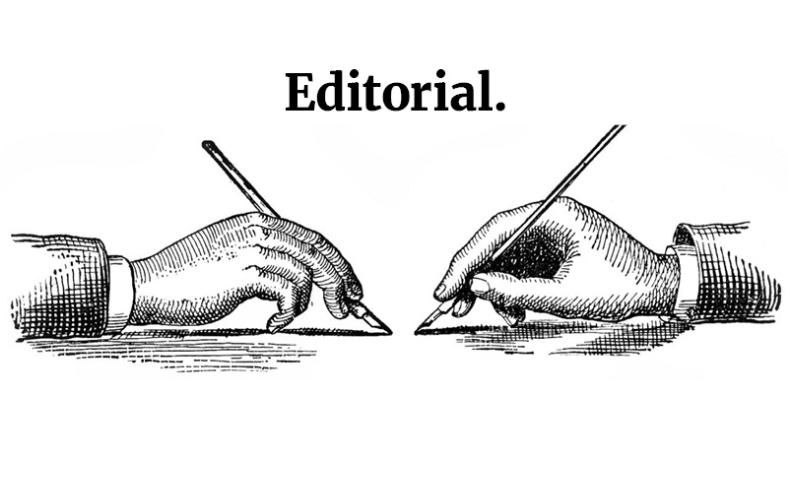
The Southern Kaduna Senatorial District has maintained its notoriety for the spate of killings perpetrated by armed men, who masquerade as Herdsmen against the communities in the area.
The killings and violent attacks have worsened in the last two years with little hope of abating despite the deployment of the police and military forces in the area.
Its worrisome that Southern Kaduna region has become yet another addition to the hotbeds of insecurity in the Northern parts of the country.
Last Sunday, there was a bloody attack on Kukum Daji village in Kagoro Chiefdom, Kaura LGA, in which some suspected Fulani Herdsmen reportedly killed 21 persons, while many others sustained injuries of varying degrees.
On Monday, less than 24 hours after the Kagoro incident, another attack occurred at Gora Gan village in Zango-Kataf LGA. In this particular incident, the invading suspected Fulani Herdsmen reportedly killed 10 persons among them a Village Head and a seven-year-old boy! The attackers were said to have arrived the community about 7.00PM in large numbers to execute their mission at the end of which several houses were burnt and scores of people injured.
According to media reports, corpses of victims were deposited at the Zonkwa General Hospital morgue, while the injured were rushed to a hospital for medical attention.
“The villagers are still searching for their missing loved ones,” a local official of the Christian Association of Nigeria (CAN) was quoted to have said.
We utterly condemn the seemingly unending regime of wanton killings and destructions in Southern Kaduna in whatever guise and for whatever reasons. For too long the “armed Herdsmen” have tormented the communities in this area. It high time they are contained.
We are miffed that even the Federal Government appears uncertain on the appropriate measures to take to stem the tide of bloodshed in the area.
Otherwise, how else could anybody explain the response to the recent killings by the Presidency “that the problem of insecurity in Southern Kaduna State is more complicated than many people are willing to admit.”?
“The problem in Southern Kaduna is an evil combination of politically-motivated banditry, revenge killings and mutual violence by criminal gangs acting on ethnic and religious grounds.”
“It is a situation in which one criminal group will kill a member of another criminal group out of ethnic and religious motivations, which in turn leads to the eruption of revenge and counter-revenge, thereby making the job of the security personnel deployed to protect lives more difficult.
“We note that revenge and counter-revenge only creates a circle of violence, thereby making everyone else unsafe, especially innocent people,” the Presidency said in a statement by Spokesperson, Malam Garba Shehu on Tuesday.
In our view, the Presidency’s stance raises more questions than proffer workable solutions to end the violence and killings.
It does appear that the failure of the security agencies to utilize intelligence to forestall attacks by the armed Herdsmen is what has largely contributed to fester the crisis.
And when the attacks occur, no arrests are made as the attackers escape without any trace. In the face of all these, there is a tendency for the victims to attempt self-defence, when faced with unprovoked attacks.
The Presidency’s stance that “from available records, Southern Kaduna enjoys comprehensive security deployments, including the Army, Special Forces of both the Army and the Air Force, surveillance aircraft by the Air Force and mobile police units that are on the ground on a 24-hour basis to forestall criminality and keep the peace,” stands directly opposite the facts as the attacks have continued.
We need not look elsewhere for the conclusion that such deployments have not worked. Its either that the security forces so “comprehensively deployed” are not on ground, inadequate or ineffective. Whichever way, there is need for change of strategy in the manner of deployment of the security personnel.
Whatever might be the case, the nation cannot afford to allow human lives to continue to waste as its case in Southern Kaduna and by extension in other areas where insecurity persists.
The Southern Kaduna crisis, to say the least, has grossly dislocated the socio-economic life of the people and created a disorder that will take a long time for normalcy to be restored. The number of people in displaced camps has continued to rise, while food shortages and other unfavourable conditions persist. The raging COVID-19 pandemic might even complicate the whole situation, the consequences of which are better imagined.
There is the need to comprehensively review the overall security strategy in Southern Kaduna. The security personnel deployed must act in a more professional, honest and transparent atmosphere and must work hard to engender the confidence of the various groups.
Only yesterday, Southern Kaduna women staged a nude demonstration to protest the killings and press for better handling of the crisis by the Federal and state governments. The ugly scene should speak to the consciousness of all those in authority to take urgent steps towards ending the violence.
We welcome the call for divine intervention in the crisis by the Southern Kaduna Baptist Convention, which marked its 100 years of existence yesterday with a strong voice for peace. Other faith groups and people of goodwill should intensify prayers and positive action to bring to an early end this needless bloodbath.
There must be an end to the carnage and the time is now.
EDITORIAL
Tinubu’s Ambassadors Should Undergo Rigorous Senatorial Scrutiny

More than two years after terminating the services of all ambassadors, appointed by the previous administration; precisely on September 2, 2023, President Bola Tinubu left Nigerian embassies fallow. It was only a few days ago that he forwarded his list of ambassadorial nominees to the Senate.
The list contains several well-known political figures – some controversial characters.
The list includes; former Chairman of the Independent National Electoral Commission (INEC), Mahmood Yakubu; former Minister of Aviation, Femi Fani-Kayode; former Abia State Governor, Okezie Ikpeazu; and former presidential aide, Reno Omokri. Given the quality and pedigree of some of the ambassadorial nominees, Nigerians have reacted with mixed feelings. Some have pointed out that after the long delay to nominate the ambassadors, the list did not contain personalities worthy of occupying prestigious positions as Nigeria’s representatives in other countries.Nigerians are still wondering why the President did not name ambassadors all this while. Diplomatic posts remained empty or were being filled by acting officials. Consequently, the emergence of the list has even elicited more questions than answers.
One of the questions on the lips of keen watchers is: why the sudden release of the nominees after strong words from United States President, Donald Trump, criticising the growing insecurity in Nigeria? Trump had threatened to send troops to Nigeria to eliminate the terrorists killing Nigerian Christians, if the government did not take action to stop them.
Although the Presidency has not confirmed any link, many Nigerians believe the list was hurriedly compiled in response to the international reactions triggered by Trump’s remarks.
Another question is: how can a country run for over two years without ambassadors when it is facing multi-dimensional challenges? What critical national issues occupied the presidency for so long that he could not appoint ambassadors who should represent Nigeria in different countries of the world? And when he visits a country, who follows up with the bilateral agreements reached?
Tongues are also wagging against the inclusion of the likes of Reno Omokri and Femi Fani-Kayode because of their flippant and skewed stance on some critical national issues that touch on national unity, ethnicity and insecurity. Nominating such people to represent a country that needs unity and peace sends a wrong signal to their host countries.
Again, the inclusion of the former INEC chairman in the list is controversial because of the role he played during the last general elections. He is been accused of mismanaging billions of naira budgeted for instant electronic transmission of previous elections which he blamed on technical “glitches”.
It is neither here nor there why such people should be rewarded with ambassadorial positions in a country where suitably qualified individuals abound.
Diplomats are expected to bridge differences, build trust, and represent the best version of their country. They are often the first impression foreign governments and investors encounter. At a time when Nigeria needs goodwill, stability, and a clear demonstration of unity, it is obvious the president missed an important opportunity to make things happen positively.
The thinking in some quarters is that Tinubu is rewarding political allegiance rather than competence or emotional intelligence. And the fear is that diplomatic missions could turn into extensions of political battlegrounds rather than centres of national service. Diplomacy requires calm judgement, respectful engagement and the ability to build relationships even with critics. The inclusion of individuals known for acidic or divisive language is not in the best interest of Nigeria.
With the emergence of 68 ambassadorial nominees, the president has undoubtedly acknowledged the essence of diplomacy, even though the nomination of certain individuals do not sit well with a good number of Nigerians due to their alleged soiled pedigree and character.
Furthermore, keen watchers see the list of the nominees as a platform for patronage that seems to reward cronies, party and family members and political jobbers because it does not reflect the quality and potentials of Nigerians as a whole.
The final list of 65 nominees raises the total number of ambassadorial candidates before the Senate to 68. Three of them Kayode Are, Aminu Dalhatu, and Ayodele Oke, have already been screened by the Senate Committee on Foreign Affairs.
DAILY ASSET is of opinion that at a critical period like this when Nigeria is at a crossroads with dampened image and low morale, ambassadorial appointments should serve as an opportunity to portray the country in good light. However, its not too late to make amends to the ambassadorial postings, since the president has demonstrated that he listens to the concerns of the Nigerian public.
Pointedly, while calling on the Senate to thoroughly screen all the ambassadorial nominees, we make bold to stress once again that the country is facing deep socioeconomic challenges, insecurity, youth restiveness and increasing ethnic suspicion. Leadership at such a time requires actions that show concern for unity, fairness and competence that should give the citizenry a sense of belonging. The ambassadorial list falls short addressing this pressing need because ambassadors as image-makers of the nation have a vital role to play in this regard.
EDITORIAL
Resuscitate Nigeria’s Yawning Abandoned Projects Now!

One of Nigeria’s greatest developmental setbacks is the prolonged abandonment of capital projects scattered across the length and breadth of the country. The abandoned projects in rot are valued at a whopping twenty trillion naira, which has for decades remained a huge embarrassment to the country.
It has defied all solutions and exacerbated the country’s chequered infrastructure development trajectory. Contrary to the lofty promises accompanying most of the abandoned projects, the remains are monuments of shame and wasted resources. This is no doubt an obvious testament to Nigeria’s perennial underdevelopment. The reasons for this monumental setback include, poor project planning, poor budgetary allocation, inefficient legal system, corruption and weak regulatory institutions.A committee set up by former President Goodluck Jonathan in 2011 had revealed that about 63 per cent of the projects initiated after Nigeria’s independence had been abandoned. The committee’s disclosure that the federal government, as at that time, had abandoned 11,866 projects was damning. Today, the ugly trend has moved from bad to worse, thus prompting members of the House of Representatives to constitute an ad hoc committee to look into the matter.The lawmakers’ decision followed the adoption of a motion of urgent national importance sponsored by the Minority Leader, Kingsley Chinda, during plenary session penultimate week. Chinda had explained that the investigation aims to curb further wastage of public resources and facilitate the recovery of valuable national assets. The lawmaker drew the attention of the House to the 11,866 abandoned federal projects nationwide, which he said represents approximately 63 percent of all projects initiated since independence; thus agreeing with the 2011 committee report of the Goodluck Jonathan administration.Among the major abandoned property highlighted by the lawmaker are the Federal Secretariat Complex in Ikoyi, Lagos; the Nigerian International Hotel, Suleja, Niger State; Millennium Tower, Abuja; the Federal Inland Revenue Service (FIRS) Building in Abia state; the National Library Headquarters, Abuja; the Nigerian Newsprint Manufacturing Company, Kaduna; the Kaduna Textile Building; and the Nigerian Aluminium Smelting Company, Delta state; among others.It is noteworthy that federal and state governments have played ignoble roles in turning Nigeria into a graveyard of incomplete roads, bridges, housing projects, white elephant projects, airports, most of which could have contributed immensely to the growth of the nation’s economy. Despite gulping $8 billion, the Ajaokuta Steel Company Limited has been abandoned by successive governments since 1978, thereby truncating the country’s industrialisation. Given this gap, the country spends about $4 billion on steel imports annually.Furthermore, investigations revealed that the Niger Delta Development Commission (NDDC) has terminated or abandoned about 1,587 projects valued at N612.4 billion, a development contrary to the essence of the commission.Again, the 3,050MW Mambilla Power Project, conceived in 1972, is yet to materialise. Many dams that should have bolstered power generation remained either abandoned or underutilised. The Ikere Gorge Dam, with a 565-million-cubic-metre water reservoir, in the Iseyin LGA of Oyo State, has been abandoned. Its turbines, imported during the late Shehu Shagari administration, are rusting away. It is the same story at the 9 MW hydropower station at the Oyan Dam in Ogun State. The three Oyan Dam turbines inaugurated in 1983 have never generated electricity. Meanwhile, according to a July 2020 report from the World Bank, 47 per cent (about 97 million) of Nigerians are entirely cut off from the national power grid.Traveling by road in the country today has become hellish due to a plethora of abandoned road projects. The Lagos-Ibadan Expressway reconstruction has not been completed after 20 years, and the Ibadan-Ife, Ife-Ilesa, Benin-Auchi-Okene-Abuja, and Port-Harcourt-Aba-Owerri- Enugu roads are death traps due to their terrible state of dilapidation. Ditto East-West Road which has suffered consistent neglect. In the South-west successive administrations left behind many abandoned roads and flyovers, making lives unbearable for many Ogun border communities.In May 2023, a Federal High Court ordered the federal government to account for the $460 million spent on the failed Abuja CCTV project. And considering the alarming rate of robberies and the growing spate of kidnappings and banditry in Abuja; the failed Abuja CCTV project could have prevented criminals from carrying out their nefarious activities. But it was abandoned because individuals and officials with itchy fingers connived and diverted the funds earmarked for the project.Again, the abandoned Rivers monorail and the Tinapa free trade zone in Cross River cost Nigeria multi billion naira in losses. The 2019 Global Competitive Index Report ranked Nigeria 130th out of 141 economies surveyed for quality infrastructure facilities. The World Bank reports a massive infrastructure deficit with total infrastructure stock amounting to 30 per cent of GDP. This falls short of the international benchmark of 70 per cent it set.From whichever angle one looks at it, there is a compelling need for the federal government to bring an end to the unending culture of abandoned projects. The government should initiate an intentional review of abandoned projects by tracing them and carrying out comprehensive reassessments to resuscitate viable ones. The contractors behind the abandoned projects should be investigated and prosecuted if found wanting. Money paid for contracts that were not done should be recovered. Infrastructure projects/ contracts should not be politicised to reduce politically induced abandonment. The current situation where the recurrent component of the budget is bigger than the capital votes is unacceptable. The federal government must reduce the cost of governance to free up more funding for capital projects. Civil servants and government officials involved in inflating contracts should henceforth be investigated and brought to book. It is high time for the federal government to revive abandoned projects through Public Private Partnerships (PPP) and other creative infrastructure contract models.However, some government projects face abandonment due to unforeseen environmental and social challenges. Issues such as land disputes, resistance from local communities and ecological concerns can delay or completely halt project implementation. In some cases, inadequate consultation with affected communities leads to conflicts that prevent project completion. Additionally, natural disasters, extreme weather conditions, and changing environmental policies may render some projects impractical to continue.The abandonment of government projects has far-reaching consequences that negatively impact economic development, social welfare and public trust in governance. These consequences manifest in various ways, affecting both the government and the local communities that depend on these projects. When government projects are abandoned, significant amounts of public funds are wasted. Money spent on planning, procurement, and partial implementation yields no tangible benefits, leading to financial losses that could have been allocated to other developmental initiatives.Abandoned projects discourage investor confidence, particularly in the infrastructure sector, where private sector participation is crucial for economic growth.Frequent project abandonment also erodes public trust in government institutions. Communities that repeatedly witness the initiation and subsequent discontinuation of essential projects develop skepticism about the government’s ability to deliver on its promises. This loss of confidence can result in political instability, reduce civic engagement and create youth restiveness.DAILY ASSET strongly believes that bureaucratic inefficiencies and weak regulatory mechanisms contribute in no small measure to project abandonment. This, coupled with inadequate coordination among government agencies are some of the contributing factors to project abandonment in the country. Political factors which give room to the abandonment of government projects should be discouraged. New administrations should not discontinue projects initiated by previous ones due to political differences and personal interests or changes in policy direction.This anomaly is particularly common when governance becomes highly politicized where successive governments fail to uphold continuity of infrastructure policies, programmes and projects as politicians often prioritize projects based on political considerations rather than actual community needs. This leads to the initiation of projects that lack long-term sustainability. By and large, authorities concerned must avoid delays in the release of funds to contractors. The lack of transparency and accountability within public institutions further exacerbates the problem, as project managers and contractors may exploit loopholes for personal gain, leading to project delays or total failure. The time to turn a new leaf is now!EDITORIAL
Declare State of Emergency in Health Sector!

It is extremely troubling that Nigeria’s health sector is deep in the doldrums. Accessing public or private healthcare facilities is at the risk of patients due to poor service delivery; lack of infrastructure, skyrocketing prices of drugs and lack of qualified caregivers.
Nigerians in the poverty bracket are worse hit because they cannot afford the high cost of medication. Ironically, the wealthy and mighty, especially those in power rather than confront the ugly spectacle to fix the dilapidated state of medical facilities for the better, fly abroad to seek medication, beginning with Nigeria’s Presidents – past and present. Consequently, the over 133 million Nigerians wallowing in multi-dimensional poverty can neither access nor afford quality healthcare. Thus they have no choice other than to contend with self-medication and other crude ways and unorthodox methods of providing medication for themselves in the midst of a compromised and neglected sector.The grim pictures of hospitals and clinics, where patients continue to experience untold hardship are legion. They range from non-availability of essential and affordable drugs or even fake drugs, lack of steady electricity supply or mounting electricity bills on hospitals and clinics – already burdened by chronic underfunding – and shortage of qualified personnel. All of these are but a sad tip of the crises in the nation’s health sector. The attendant result is high mortality rate of lives and fast declining life expectancy rate of average Nigerians.This is totally unacceptable because Nigeria, as Africa’s most populous nation with massive human and natural resources cannot continue to neglect and abandon the healthcare sector without keeping to the long held axiom of ‘Health is Wealth.’Is it not shameful of the government for failing to fashion out a clear-cut and pragmatic health policy for the provision of quality healthcare for all and sundry? This has led to the brain drain syndrome. Similarly, there is a highly disjointed health insurance system mandated to ease access to affordable and efficient medical care for all citizens.Worse still, Nigeria from which angle one looks at it, is barely operating its troubled three-tier healthcare system. First, is the unhealthy state of primary health care, which encompasses community-based health centers that offer basic medical services, vaccinations, and maternal care. Second, is the secondary healthcare, comprising state or general hospitals charged to handle more complex cases and minor surgeries is almost comatose and in dire need of qualified personnel, infrastructure and adequate funding.Similarly, the state of the teaching hospitals and specialized centers that should provide advanced treatments such as surgeries and specialized care under the auspices of tertiary healthcare are also alarmingly performing below expectation due to poor infrastructure, inadequate funding and lack of qualified personnel, other setbacks in the sector, notwithstanding. This bleak picture of the state of a critical sector gasping for breath, should serve as a clarion call on the Federal Government to wake up from its slumber and inject a new lease of life into the sick sector which urgently needs deliberate and total surgical operation.Again, access to quality healthcare is glaringly uneven because there exists a gulf between the urban areas and hinterland as the former has better facilities than the latter. As crises overwhelm this critical sector, Nigerians battle daily to afford basic healthcare services across the country, while wealthy Nigerians travel abroad for medical attention in the face of dilapidated facilities of their country. In other words the powers-that-be are actually not oblivious of the ailing state of the sector. Unfortunately the ugly situation is exacerbated by the unending exodus of doctors, nurses, experts, and specialized professionals from the country in search of greener pastures abroad, a situation which has dealt a fatal blow to what remains of an already vulnerable sector.Despite these challenges, the sector no doubt presents tremendous opportunities for innovation, investment and reform with the right policies that prioritize funding and technology. Nigeria allocated N2.48 trillion to the health sector for the 2025 budget representing 5.18% of its national budget to healthcare, far below the 15% target recommended by the African Union’s (AU) Abuja Declaration. Many public hospitals depend on out-of-pocket payments, making healthcare inaccessible for low-income citizens.Regrettably, the National Health Insurance Scheme (NHIS) for instance, covers only about 10% of Nigerians – meagre – leaving millions uninsured. This is due to the fact that there is low investment in medical research, innovation and pharmaceuticals, thereby affecting the quality of healthcare delivery. Without adequate funding, the health sector cannot improve service delivery, train professionals and provide infrastructure.Besides, Nigeria has a serious shortage of doctors, nurses, and specialists, largely due to brain drain, where trained professionals migrate abroad for better salaries and working conditions. Over 50% of Nigerian doctors work in countries like the UK, USA, and Canada. Poor salaries, lack of job satisfaction, and unsafe working environments force thousands of healthcare workers in Nigeria to migrate annually. In some states, the patient-to-doctor ratio is as high as 5,000 patients to a doctor (far below the WHO recommendation of 1 doctor to 600 patients. This mass exodus of health personnel denies millions of Nigerians adequate medical care, leading to high mortality rates and disease burden.Nigeria faces a dual disease burden of communicable and non-communicable diseases, including hypertension, diabetes, stroke and cancer. In addition, there is rising lifestyle-related diseases. This is not talk of the ravaging high maternal and infant mortality rates due to poor antenatal and emergency care. As if all these challenges are not enough, many Nigerians die from preventable or treatable illnesses due to late diagnosis, poor healthcare access, and lack of awareness.Nigeria, is a signatory to the 2001, Abuja Declaration, an agreement made by heads of states and governments under the African Union (AU) that encourages countries to dedicate at least 15 per cent of their annual budgets to the health sector. But Nigeria has never met the 15 percent bench mark of the declaration since she became a significant party to it.DAILY ASSET is in total support of the compelling need to declare a state of emergency in the health sector. With the right policies and reforms, clear timelines to tackle the crises, a strategy would have been derived to tackle the decay frontally. This will give rise to a progressive and productive system that should benefit all citizens. No serious nation neglects its healthcare.Above all, the time has come for all critical stakeholders in the sector to collaborate with the government at all levels to initiate a deliberate campaign for the revival of the ailing sector, because Nigeria as a country needs modern medical equipment and advanced technology, and the establishment of more hospitals and facilities.It is time to institutionalise mandatory health insurance policy for all Nigerians to enable them access quality medicare.
